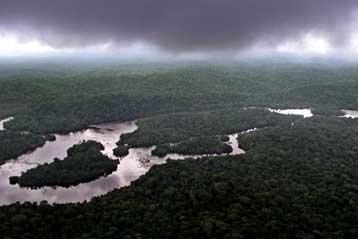Scientists take a second look at biofuels - International Herald Tribune: "Scientists take a second look at biofuels"
AMSTERDAM: Just a few years ago, politicians and green groups in the Netherlands were thrilled by the country's early and rapid adoption of "sustainable energy," achieved in part by coaxing electricity plants to use some biofuel — in particular, palm oil from Southeast Asia.
Spurred by government subsidies, energy companies became so enthusiastic that they designed generators that ran exclusively on the oil, which in theory would be cleaner than fossil fuels like coal because it is derived from plants.
But last year, when scientists studied practices at palm plantations in Indonesia and Malaysia, this green fairy tale began to look more like an environmental nightmare.
Rising demand for palm oil in Europe brought about the razing of huge tracts of Southeast Asian rain forest and the overuse of chemical fertilizer there. Worse still, space for the expanding palm plantations was often created by draining and burning peat land, which sent huge amount of carbon emissions into the atmosphere.
Factoring in these emissions, Indonesia had quickly become the world's third-leading producer of greenhouse gases that scientists believe are responsible for global warming, ranked after the United States and China, concluded a study released in December by researchers from Wetlands International and Delft Hydraulics, both in the Netherlands.
"It was shocking and totally smashed all the good reasons we initially went into palm oil," said Alex Kaat, a spokesman for Wetlands, a conservation group.
Biofuels, long a cornerstone of the quest for greener energy, may sometimes produce more harmful emissions than the fossil fuels they replace, scientific studies are finding.
As a result, politicians in many countries are rethinking the billions of dollars in subsidies that have indiscriminately supported the spread of all of these supposedly "eco-friendly" fuels, for use in power vehicles and factories. The 2003 European Union Biofuels Directive, which demands that all member states aim to have 5.75 percent of transportation fueled by biofuel in 2010, is now under review.
"If you make biofuels properly, you will reduce greenhouse emissions," said Peder Jensen, of the European Environment Agency in Copenhagen. "But that depends very much on the types of plants and how they're grown and processed. You can end up with a 90 percent reduction compared to fossil fuels — or a 20 percent increase."
"Its important to take a life cycle view," he said, and not to "just see what the effects are here in Europe."
In the Netherlands, the data from Indonesia has provoked soul searching, and prompted the government to suspend palm oil subsidies. A country that was a leader in green energy in Europe has now become a leader in the effort to distinguish which biofuels are truly environmentally sound. The government, environmental groups and some of the "green energy" companies in the Netherlands are trying to develop programs to trace the origin of imported palm oil, to certify what is produced in an eco-friendly manner.
Krista van Velzen, a member of Parliament, said the Netherlands should pay compensation to Indonesia for the damage palm oil has caused. "We can't only think, 'Does it pollute the Netherlands?'"
Biofuels are heavily subsidized throughout the developed world, including the European Union and the United States, and enjoy tax breaks that are given because they more expensive to produce than conventional fuel.
In the United States and Brazil most biofuel is ethanol, derived from corn and used to power vehicles. In Europe it is mostly local rapeseed and sunflower oil, used to make diesel fuel. But as many European countries push for more green energy, they are increasingly importing plant oils from the tropics, since there is simply not enough biomass at home.
On the surface, the environmental equation that supports biofuels is simple: Since they are derived from plants, biofuels absorb carbon while they are grown and release it when they are burned. In theory that neutralizes their emissions.
But the industry was promoted long before there was adequate research, said Reanne Creyghton, who runs Friends of the Earth's anti-palm oil campaign in the Netherlands. "Palm oil was advertised as green energy, but there was no research about whether it was really sustainable."
Biofuelswatch, an environmental group in Britain, now say that "biofuels should not automatically be classed as 'renewable energy.'" It supports a moratorium on subsidies until more research is done to define which biofuels are truly good for the planet. Beyond that, the group suggests that all emissions rising from the production of a biofuel be counted as emissions in the country where the fuel is actually used, providing a clearer accounting of environmental costs.
he demand for palm oil in Europe has skyrocketed in the past two decades, first for use in food and cosmetics, and more recently for biofuels. This versatile and low-cost oil is used in about 10 percent of supermarket products, from chocolate to toothpaste, accounting for 21 percent of the global market for edible oils.
Palm oil produces the most energy of all vegetable oils per liter when burned. In much of Europe it is used as a substitute for diesel oil, though in the Netherlands, with little sun for solar power and little wind for turbines, the government has encouraged its use for electricity.
Supported by hundreds of millions of euros in national subsidies, the Netherlands rapidly became the leading importer of palm oil in Europe, taking in 1.5 million tons last year, a figure that has been nearly doubling annually. The Dutch green energy giant Essent alone bought 200,000 tons, before it agreed to suspend new purchases until a better system for certifying sustainably grown palm oil could be developed. The company now has replaced the palm oil it used with conventional sources of energy and local biofuels.
But already the buoyant demand has created damage far away. "When you drastically increase the demand for agricultural products, that puts new pressure on the land and can have unintended consequences and hidden costs," Jensen, of the European Environment Agency, said.
Friends of the Earth estimates that 87 percent of the deforestation in Malaysia from 1985 to 2000 was caused by new palm oil plantations. In Indonesia, the amount of land devoted to palm oil has increased 118 percent in the past eight years.
Oil needed by poor people for food was becoming too expensive for them. "We have a problem satisfying the Netherlands' energy needs with someone else's food resources," said Creyghton of Friends of the Earth.
Such concerns were causing intense misgivings about palm oil already when, in December, scientists from Wetlands International released their bombshell calculation about the global emissions that palm farming on peat land caused.
Peat is an organic sponge that stores huge amounts of carbon, thereby helping to balance global emissions. Peat land is 90 percent water. But when it is drained, those stored gases are released into the atmosphere.
To makes matters worse, once dried, peat land is often burned to clear ground for plantations. In recent years Indonesia has been plagued by polluting wildfires so intense that they send thick clouds of smoke over much of Asia.
The Dutch study estimated that the draining of peat land in Indonesia releases 600 million tons of carbon into the atmosphere a year and that fires contributed an additional 1,400 million tons annually. The total, 2000 million tons, is equivalent to 8 percent of all global emissions caused annually by burning fossil fuels, the researchers said.
"These emissions generated by peat drainage in Indonesia were not counted before," Kaat, of Wetlands International, said. "It was a totally ignored problem." For the moment Wetlands is backing the certification system for palm oil imports, to make sure it is grown and processed in a sustainable manner.
But some environmental groups are convinced that palm oil cannot be produced sustainably at reasonable prices. Part of the reason palm oil is now relatively inexpensive is because of poor environmental practices and labor abuses, they say.
Still, some Dutch companies like Biox, a young company fully devoted to producing energy from palm oil, are confident there will be a solution and are banking on this biofuel.
Biox has applied to build three palm oil power plants in the Netherlands; the first one gained approval just last week. It is currently auditing its plantations and refineries in Indonesia for sustainability.
"Yes, there have been bad examples in the palm oil industry," said Arjen Brinkman, a company official. "But it is now clear that to serve Europe's markets for biofuel and bioenergy, you will have to prove that you produce it sustainably — that you are producing less, not more CO2."












